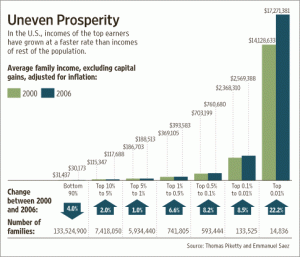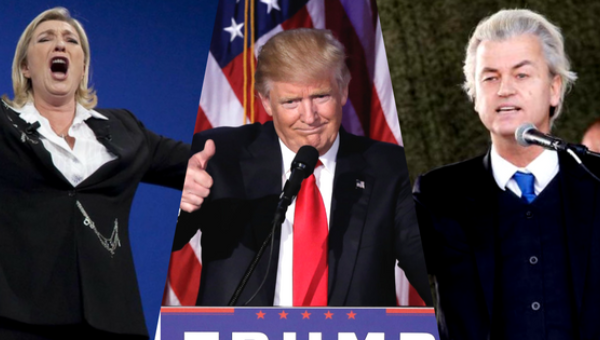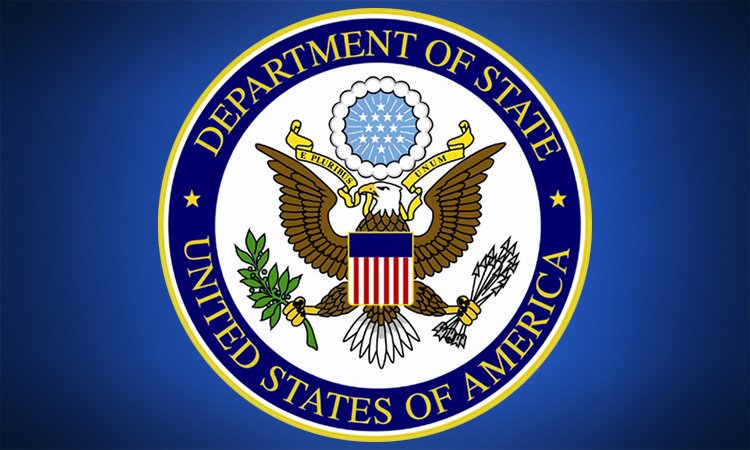In the decades leading up to 2016, the secular economy that we live and work in became increasingly globalized due to extensive advancements in the realms of technology and communication. By the end of the year, nearly all the key agreements that help sustain this new world order, from the North American Free Trade Agreement (NAFTA) to the World Trade Organization (WTO), had been subject to intense backlash from resurgent populist leaders all around the globe, from Marine le Pen in France and Geert Wilders in the Netherlands, to Donald Trump in the United States. Following the British vote to leave the European Union in September and Trump’s victory in the U.S. Presidential election in November, those in the economic policy community have legitimate reason to worry about the fiery anti-trade rhetoric that has seeped into mainstream political discourse heading into 2017.
Now that income inequality is at historic highs in the United States, public opinion towards globalization has turned decidedly negative, mirroring trends seen in other developed countries in the West such as France and Italy. While many of the complaints heralded by America’s working class and channeled through President Trump stem from legitimate gripes, backtracking the deals that have contributed to so much of America’s prosperity over the past two decades will objectively hurt those middle- and lower-class workers he claims to adamantly defend. The policy concern of our generation ought not to be the reversal of our prized trade deals, but rather the reallocation of awarded capital in a fair and effective manner.
This issue of income inequality has been swept under the rug by politicians and economists around the world for much of the past decade, despite the numbers showing dramatic increases almost every year. According to Emmanuel Saez, an economist at the University of California-Berkeley, the current level of income inequality in America has not been this high since 1928, just before the Great Depression. Almost a century later, similarly-neglected socioeconomic groups have fought and won around the globe for what they perceive as political representation, and we’ve since seen an uprising in the long-forgotten Populist movement that first saw prominence in the late 19th century. President Trump’s supporters rightly argue that free trade unevenly awards those in the upper tax brackets more than the lower, and both long- and short-term trends support this supposition.

Aside from the obvious income inequality, it is also relevant to note that employment prospects in general for those in lower tax brackets diminish congruently with their income, as low-skilled jobs in fields like manufacturing and food service are increasingly either shipped overseas or converted into automated technology. Conversely, those with access to elite educations and extensive social capital find themselves with a wide and diverse range of career opportunities that were non-existent less than a decade ago, from working to develop artificial intelligence in Silicon Valley to crafting deals in the rapidly-expanding global financial marketplace. This natural caste system is a feature, even a benefit, of robust and expanding free markets, but problems arise when the nature of the inequality becomes so systemic that those in the lower classes are no longer presented with opportunity to become upwardly mobile.
So, if our elected officials in the West begin to roll back on globalization, who will be the most affected? The flow of cheap goods and services into the U.S. consumer marketplace has undoubtedly been a keystone feature of the globalized economy. President Trump’s proposed 5 percent tariff on all imported goods would diminish these gains and contribute to gradual increases in the Bureau of Labor Statistic’s Consumer Price Index (CPI), a broad measure of the prices of various goods and services that can be tracked over time and is adjusted for inflation. Apple’s iPhone, which crosses several borders throughout its manufacturing process, is an example of one good that would become more expensive should even half of President Trump’s policies be enacted. Historically, tariffs have been used to promote American business interests over the comparative advantage some foreign countries may have when producing certain goods. The U.S. sugar industry, for example, has successfully lobbied for import quotas on raw-sugar that force American consumers to pay around 43 percent higher than the rest of the world, on average. While policies like this have been the exception to America’s long-standing commitment to free and fair trade, members of the current administration have made clear their desire to instead promote “economic nationalism,” a policy body that relies primarily on protectionism and isolationism. In Venezuela, where similar policies were enacted by President Nicolas Maduro following his inauguration in 2013, inflation reached 800 percent for fiscal year 2016.
The current period of historically cheap goods and services has been the primary contributor to the expansion of America’s middle class in the 21st century. Still, the poor and nearly-poor have seen only marginal improvements in their quality of life, while watching the middle- and upper-classes’ skyrocket. According to a recent study conducted by French economist Thomas Piketty and Emmanuel Saez, real income for the bottom 50 percent of the population has grown only 21 percent from 1980 to 2014, compared to 194 percent for the upper 1 percent over the same period of time.
To address this disparity, elected officials should consider policies other than isolationism and instead focus on how we can make our new-age prosperity work for everyone. Excessive corporate tax rates in the U.S. have led many corporations and high-net worth individuals to seek tax shelters abroad, limiting their contributions to the federal and state coffers. Those in the upper tax brackets can afford to contribute much more to the public budget, and the effective use of these funds would bring a more broad-based welfare to every income class. The reallocation of capital through fiscal policy is a good starting point, but a systemic issue such as our current state requires reform across several industries and departments.
Public education, for example, is an American institution long overdue for reform. As Piketty points out in his 2015 book “The Economics of Inequality”, the findings of the Coleman Report of 1966, which stated that the amount of public funding school systems receive has little to no impact on academic performance, have been largely reinforced by subsequent studies leading up to 2017. Because the success of each student “depends more on the ‘quality’ of his classmates than on that of his teacher,” Piketty argues that further integration of the public education system, as well as school choice policy measures, is the first step in solving the issue of human capital inequality.
From a fiscal policy standpoint, other proposed solutions include Bill Gates’s “progressive consumption tax,” the business magnate and philanthropist’s response to the findings of Piketty’s controversial studies. Such a tax would be levied heavily on the consumption of those who clear certain income hurdles, and lightly on the consumption of the poor. The idea is that those in the upper tax brackets who invest their capital in business and charity pay a lower rate than those in the same bracket who spend their money on things like yachts, luxury cars, and designer clothes. This way, the politically-popular consumption tax doesn’t hurt the lower classes, who tend to spend, rather than save, a higher proportion of their income.
Over time, it will become clear that President Trump’s policies do very little for the lower- and middle-classes, while continuing to empower the upper-class that he was born into. As companies are forced to relocate manufacturing plants or pay premiums for goods built in the United States (or else be subjected to a Trump tweet, and subsequent stock price volatility), corporate profits will lag and hiring will inevitably be forced to slow down as well. Our 45th President is quick to blame other countries such as China and Mexico for the misfortunes of America’s working class, but, following Trump’s inauguration, the biggest threat to our broad-based economic prosperity will be found right here in our own nation’s capital.


